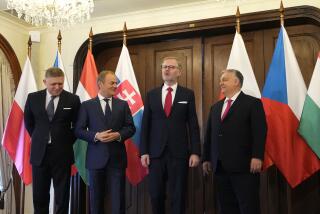East Bloc United in Demand for Trade Reforms : Economics: For the first time, Comecon members freely exchange ideas, clashing only on how fast to go with changes.
- Share via
SOFIA, Bulgaria — Leaders from the 10 member nations of Comecon, the Soviet-led trading bloc, agreed Tuesday on the need to overhaul their antiquated organization but differed sharply on the pace and extent of the reforms required.
In a new spirit of freewheeling exchange in Eastern Europe, differences were aired openly during the first day of a two-day Comecon meeting here.
Czechoslovakian Finance Minister Vaclav Klaus, for example, strenuously opposed a Polish proposal backed by several other nations to establish an ad-hoc commission that would study how best to carry through the reforms and present an action plan to a Comecon summit in two to three months.
“The changes must be dramatic, they must be radical and they must be done now,” Klaus told reporters following Tuesday’s plenary session. “There’s no time for a commission to work for months. We’ll try to torpedo that tomorrow but I don’t know if we’ll succeed.”
Added another senior Czechoslovak economic planner, Vladamir Dlouhy: “There is nothing new to invent here. We’re talking about returning to normal international markets and normal trade.”
The Czechs also reportedly clashed with Moscow on the extent of reform needed.
Both countries advocated a move to clear trade imbalances by using hard currency; however, the Soviets reportedly want to keep government ministries involved in trade arrangements, while the Czechs want to end such direct official involvement in specific transactions.
Much of Tuesday’s session, which was attended by seven prime ministers, was spent dealing with how best to open up the inward-looking trading bloc, which until a few months ago consisted of inflexible, centrally planned Communist economies content to trade inferior goods mainly among themselves.
The leaders focused on ways to integrate Comecon countries into the world family of trading nations and dealt with such issues as how to create genuine competitive markets in the region.
“It will be a turning point in the history of our organization,” predicted the host for the meeting, Bulgarian Prime Minister Georgi Atanassov.
“Everyone agrees that fundamental changes are needed,” Dlouhy added.
Prague’s tough line in the present meeting reflects the relative strength of the Czechoslovak economy as well as the belief of its leadership that the country can benefit most from immediate exposure to free-market pressures, including those in the West. It is a sentiment that is apparently shared by two other industrialized Comecon members, Poland and Hungary.
Other member states such as Romania, and to a lesser extent Bulgaria, would require massive help before considering such a move.
While Klaus stopped short of saying that Czechoslovakia is ready to leave Comecon, he said the country is “considering withdrawing from some (Comecon) agreements” if no progress is achieved at the current meeting.
He said Czechoslovakia will insist on the right to unilaterally control its exchange rates with its Comecon partners and, if necessary, will ignore the bloc’s provision that such rates be altered only by agreement.
He also indicated that if Comecon fails to implement key reforms, Czechoslovakia will most likely launch its own set of bilateral agreements with member countries and effectively ignore the organization as an entity.
More to Read
Sign up for Essential California
The most important California stories and recommendations in your inbox every morning.
You may occasionally receive promotional content from the Los Angeles Times.









